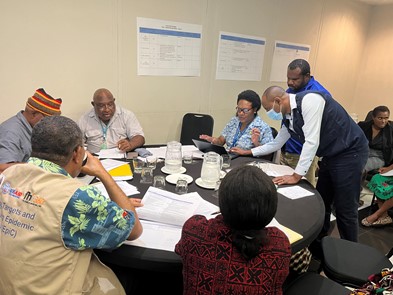
- Report -

Ukraine
Making every school a health-promoting school: global standards and indicators
author




- Improved access to quality essential health services irrespective of gender, age or disability status
- Countries enabled to provide high-quality, people-centred health services, based on primary health care strategies and comprehensive essential service packages
- Strengthened country capacity in data and innovation
Defining Competency Profiles for Monitoring and Evaluation and Health Information Roles
In Papua New Guinea, gaps in health information workforce capacity remain a challenge at the national and sub-national levels. To address them, WHO Papua New Guinea collaborated with the National Department of Health (NDoH) to develop a standard set of competencies needed for data-related roles at the national and provincial levels. This initiative resulted in the government's adoption of the competency profiles, serving as a milestone in systematic and sustainable capacity building. With the profiles now defined, targeted actions are being taken to develop training needs assessment tools and long-term capacity building plans based on the competencies. Future capacity building activities will be implemented according to the competencies required for specific roles, rather than ad-hoc or donor-driven approaches. These efforts are expected to contribute to increasing Universal Health Coverage (UHC) in Papua New Guinea.
Key WHO Contributions
Development of a Data Management Competency Framework adapted to Papua New Guinea’s context
Drafting competency profiles for health information roles and facilitating their adoption by the Government
Formulating capacity-buildingvplans with the Government based on the identified competency profiles.
How did Papua New Guinea, with the support of the WHO Secretariat, achieve this?
In Papua New Guinea, there is a shortage of adequate and skilled health information workers at both the national and sub-national levels. This hampers the timely production, processing, analysis, and use of quality data, which is essential for improving health outcomes. To address this challenge, the Monitoring and Evaluation (M&E) Strategic Plan for the country's 2021 to 2030 National Health Plan incorporated capacity building in M&E and health information [1]. The aim is to equip Papua New Guinea’s health workforce with the necessary skills to undertake data management, analysis, and data quality assessments.
A competency-based approach, which is oriented around the ability of health workers to effectively combine their knowledge, skills, and attitudes in practice, is regarded as an effective way of systematically building capacity. To support countries in their quest for UHC, WHO has a Global Competency Framework, while the WHO Regional Office for the Western Pacific’s Data, Strategy and Innovation (DSI) team developed a Data Management Competency Framework. The latter defines competency profiles tailored to roles for health information workforce including decision makers, managers and implementors.

In August 2022 WHO consulted with key stakeholders in Papua New Guinea to better understand health information roles and responsibilities.
Photo credit: WHO Papua New Guinea.
To ensure that the framework was adapted to the context of Papua New Guinea, WHO Papua New Guinea collaborated with the NDoH in August 2022 to define competencies for three different health information roles at the national and provincial levels, including in hospitals. This involved mapping health information roles, analyzing the job descriptions of provincial health information officers, medical records officers, and M&E officers at the NDoH, interviewing officers to gain an improved understanding of their roles and responsibilities, and consulting with relevant stakeholders. This initiative generated productive conversations on capacity building plans, career pathways, and the significance of health information roles in Provincial Health Authorities.
“Discussions on data management competencies were necessary and long overdue. The guidance will be helpful for provincial health authorities, as strengthening our human resource capacity is critical for improving data quality. With these profiles, capacity building plans can now be developed, and trainings or other activities designed to ensure they are building the required competencies in the health information workforce”
- Dr. Dokup, Director of Clinical Health Services, Provincial Health Authority of the National Capital District
In October 2022, WHO Papua New Guinea collaborated with the NDoH to host a national health information workshop. During the workshop, the draft competency profiles developed for health information roles at the provincial level were thoroughly reviewed and adopted by the government of Papua New Guinea. The NDoH, with technical assistance from WHO Papua New Guinea, is currently formulating capacity-building plans based on the identified competency profiles, to enable targeted action.
“I was excited to see clearly the competencies required in the three health information role types, when my team presented the analysis which had been undertaken with support of WHO. This is something we have never had before, and it felt ground-breaking. We now have a clear basis by which to develop capacity building plans.”
- Ms. Manah Dindi, Manager of the Performance, Monitoring and Research Branch at the NDoH
To successfully develop competency profiles, it was essential to understand the context of health system integration to be able to focus on building and preserving capacity in the long-term. To ensure this was done effectively, a backcasting approach was needed. This involved looking ahead and analyzing future health information needs and competencies. A participatory approach involving all stakeholders in health information in the country was necessary to ensure that all needs were identified. This allowed the changes in data needs and skills to be understood, and the team gained lessons from these changes. WHO Papua New Guinea continues to provide technical support to the country to ensure that health information systems are fit for purpose and that capacity building is at the heart of health information management.
- Improved access to quality essential health services irrespective of gender, age or disability status
- Countries enabled to provide high-quality, people-centred health services, based on primary health care strategies and comprehensive essential service packages
